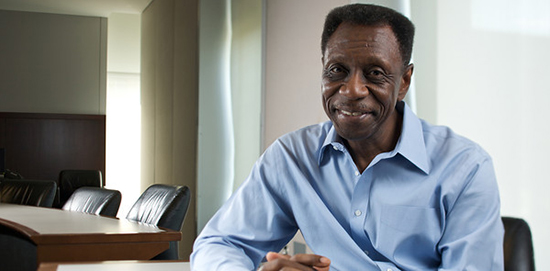Dean Emeritus William Bradford, seminal supporter of minority business development, takes a bow
Bill Bradford is not exactly a founding father of the Foster School’s Consulting and Business Development Center. But he could be called a funding father. A catalyst. And an author of the center’s inspiration.
Bradford was the Foster School dean who green-lighted the vision of Michael Verchot and Emeritus Professor Thaddeus Spratlan, and who provided the seed money to launch their plan to spur minority business development in the mid-1990s.
More significantly, perhaps, Bradford generated many of the groundbreaking studies of minority enterprise that provided the empirical foundation for the center’s aspirations.
“Early on I got the idea that if the US is going to maintain its economic status in the world, then it’s going to have to use all of its resources as best as possible,” says Bradford. “And if there is a set of people who are not systematically reaching their potential, then all of us stand to lose.”
For a career of major contributions to economic development among minority populations, Bradford was inducted this year to the Minority Business Hall of Fame—only the third academic to receive this honor.
Catalytic conversion
Bradford grew up in Cleveland, eventually choosing the academic life over the family business of ministry (his grandfather and father led Baptist congregations, as do two of his brothers).
He earned a BA from Howard University and an MBA and PhD from Ohio State in 1972. Prior to joining the Foster School, he was on the faculties of NYU, Stanford, and the University of Maryland Smith School of Management, where he also served as chair of the finance department and associate dean of academic affairs.
Bradford became the first African-American dean of the Foster School in 1994.
By the time of his Foster appointment, Bradford’s prolific research had already established him as one of the foremost experts on minority wealth creation and management, entrepreneurship and economic development in the context of minority-owned businesses.
When Verchot and Spratlan pitched a program that would leverage his (and others’) academic work by deploying student teams to accelerate the growth of small minority-owned businesses, Bradford was more than intrigued.
“My thought was that we are a public university,” he says. “So we needed to contribute not only to the Boeings and Microsofts, but also to small firms, and those firms in less economically developed areas. I didn’t know if the program was going to work, but there was a demand, and it was a way to connect with the community.”
Verchot recalls finding more than just a champion in Bradford. “What was exciting about Bill being appointed dean was that he brought with him 25 years of research and publishing on minority business development,” says Verchot. “He became a catalyst— someone who not only understood and supported what we were trying to do, but who had actually done some of the seminal work that we could refer to.”
Living legacy
When he stepped down as dean in 1999, Bradford was named the Endowed Professor of Business and Economic Development at the Foster School, an honor financed by a group of anonymous donors. That same year, what is now the Consulting and Business Development Center instituted the William Bradford Minority Business of the Year Award, the premier honor for minority-owned businesses in the state of Washington, based on revenue size, management quality and commitment to community.
Today Bradford continues to publish actively, shaping public policy and private sector practice. His current research investigates venture capital investment in minority-owned firms. He’s finding that such firms earn investors a higher average rate of return compared to the general population of venture-funded firms.
And he continues to serve on the board of a flourishing Consulting and Business Development Center, and as its faculty director.
“When we began, Bill’s knowledge stretched us to think bigger and further than we might have otherwise,” reflects Verchot. “Had he not been dean when we were just getting started, it’s hard to imagine the center even existing today.”

